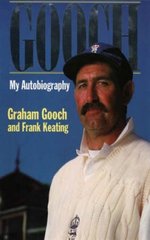Gooch: My Autobiography
David Taylor |Published: 1995
Pages: 320
Author: Gooch, Graham with Keating, Frank
Publisher: Collins Willow
Rating: 3.5 stars

The deeds of the heroes of my youth are receding ever further into cricket history; this summer it will be twenty years since Ian Botham and David Gower played in a Test match for England. Another went on a little longer, partly because he was by then captain, and also because his dependability, experience and sheer volume of runs made him simply indispensable to the selectors. The ultimate late bloomer, Graham Gooch was almost 37 and had notched up some 80 Tests when he made 333 at Lord’s in 1990, watched by the man whose record he threatened, Sir Leonard Hutton.
That innings gets plenty of coverage here, as does the disastrous debut fifteen years earlier when he fell to Walker and Thomson of Australia for a pair at Edgbaston. Dropped after the next match, Gooch had to endure two seasons out of the England side; the move to opening the innings for Essex was the making of him, and led to his recall to partner Geoff Boycott for England. And there he stayed, for the most part, until his farewell tour of Australia in 1994-95. Utterly resolute and dependable, Gooch was a reassuring presence at the top of the order through lean times and good for England supporters. Impassive under his white helmet, with trademark droopy moustache, he wasn’t simply defending the fortress – he was the fortress.
Months after making his final appearance, this book was published, a joint effort with veteran sportswriter Frank Keating. I am not at all familiar with Keating’s work, although his is a name I have seen many times over the years. This was his seventh book, but in truth I am not sure how many have been about cricket. Significantly though, he is a co-writer, not a mere “ghost” – his name is on the front cover for one thing, and the chapters, or part-chapters are headed “GG” or “FK” depending on who they were written by. Gooch’s style is as no-nonsense as the man’s batting, although he writes movingly about the deaths of his friend and mentor Ken Barrington and boyhood hero Bobby Moore, and comes up with some good anecdotes about Keith Fletcher, Derek Pringle and David Steele, among others.
I was particularly interested to read what Gooch had to say on two matters – the “rebel tour” to South Africa early in 1982, which resulted in his receiving a three year ban from Test cricket, and his role in prematurely ending the career of Gower, as a party to the widely condemned decision to omit him from the India tour of 1992-93. About the first I was not surprised. Gooch admits to feeling some trepidation as the news was about to emerge, wondering if he had jeopardised his career, but maintains throughout that he had no regrets about the episode, even though it caused a rift with his father for a while. He was shocked at the length of the ban (although if he really thought it would only be a match or two he was hopelessly naive) but Keating points out that it was perfectly timed from the TCCB’s viewpoint, excluding the rebels from series against India, Pakistan and West Indies while ensuring they would be available for the visit of the Australians in 1985. At least he doesn’t try to kid us that the advancement of multi-racial cricket in South Africa was one of his main motives in going – he concedes it was all about the bank balance. As for Gower, he admits that he would undeniably have been useful on what proved a difficult tour.
Unsurprisingly it is the professional writer’s prose that flows more easily but Gooch writes surprisingly well, and provides a good deal of insight into cricket at both county and Test level during the course of his long career. There is also a good statistical appendix, as well as two sections of photographs.






I’m a trifle surprised that you’re not familiar with the work of Frank Keating. He was for many years a feature writer on the Guardian, covering a wide range of sports, where his witty and generous prose won him many admirers. Among his other books was a collaboration with Ian Botham, but he was widely read by many people who weren’t particularly interested in sport. Perhaps the nearest we have to him in terms of present day writers would be Barney Ronan, also of the Guardian.
Comment by John Perry | 5:08pm GMT 10 December 2018